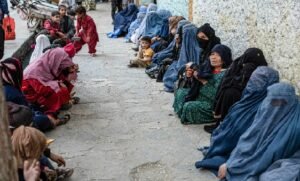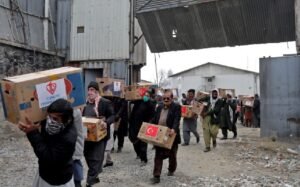16-08-2025
KABUL: Aid agencies say more than half of Afghanistan’s population, roughly 23 million people; need humanitarian assistance.
The Taliban denied using force to divert international aid in Afghanistan on Thursday, responding to a US watchdog report that said authorities used “every means at their disposal, including force,” to ensure that aid goes where they want it to.
 The 118-page report, published a day earlier by the US Special Inspector General for Afghanistan Reconstruction, said the Taliban use their regulatory power to determine which NGOs may operate and under what conditions.
The 118-page report, published a day earlier by the US Special Inspector General for Afghanistan Reconstruction, said the Taliban use their regulatory power to determine which NGOs may operate and under what conditions.
The report added that the Taliban block and redirect aid to ensure it benefits Pashtun communities over minority Hazara or Tajik groups and that they refuse to allow NGOs to operate unless they hire Taliban-affiliated businesses, NGOs and individuals.
Until recently, the US was the largest donor to Afghanistan and last year provided 43% of all international humanitarian funding to Kabul but the administration of US President Donald Trump stopped foreign aid to the country because, according to officials, the money was benefiting the Taliban.
The watchdog report, based on interviews with 90 current and former officials, including at the UN and from the US, also found that an employee at an Afghan NGO was killed for exposing the diversion of food aid to Taliban military training camps. “The Taliban may manipulate exchange rates and rig currency auctions of imported US dollars for profit,” the report stated.
It added that the Taliban may “also collude with senior UN officials to demand kickbacks from UN vendors.”
A 2023 United States Institute of Peace report found that the Taliban had “infiltrated and influenced” most UN-managed assistance programs.
A spokesperson for Afghanistan’s Economy Ministry, which oversees foreign and domestic NGOs, rejected the report’s findings, claiming that humanitarian aid from international organizations was provided directly by domestic and foreign bodies through UN offices, without the intervention of Taliban institutions.
 “We strive to create the necessary facilities for aid organizations to promote economic growth and reduce poverty,” said the spokesperson, Abdul Rahman Habib, adding that “We support the transparent activities of domestic and foreign organizations and monitor their projects.”
“We strive to create the necessary facilities for aid organizations to promote economic growth and reduce poverty,” said the spokesperson, Abdul Rahman Habib, adding that “We support the transparent activities of domestic and foreign organizations and monitor their projects.”
The UN mission in Afghanistan told media in a statement that the report highlighted the “extremely complex operating environment” for aid delivery in Afghanistan, including attempts at interference and restrictions from authorities.
It also addressed the report’s “kickback” allegations.
“We take extremely seriously any allegations of malpractice and corruption, either by United Nations officials or implementing partners, and ensure these are promptly investigated,” the statement said.
“We encourage anyone in possession of any evidence of aid diversion, misuse, misconduct, fraud, and abuse to immediately report such information through the established, formal, and confidential reporting channels so that these can be investigated.”
A USAID official told the watchdog in 2023 that the Taliban refused to register women-led NGOs, prevented them from opening bank accounts, refused to authorize women-focused projects, demanded that women on boards of directors be replaced with men and threatened to close organizations that failed to comply with their policies. (Int’l News Desk)
 Pressmediaofindia
Pressmediaofindia




